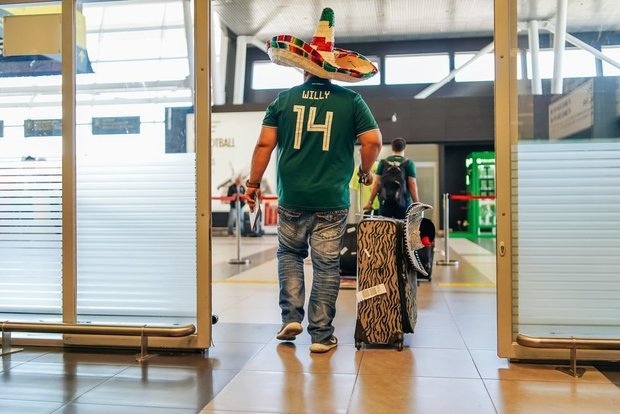To earn on WC: foreigners spent billions on fast food, accommodation and clothes
The total expenses on WC host cities map amounted to 100 billion rubles. Moscow got 80 billion rubles, Kazan had 1,5 billion
Banks are drawing conclusions of the 2018 FIFA WC: the expenses in the host cities have doubled or tripled and totalled about 100 billion rubles. Fans from the USA and China were the most generous, while the money was spent on food, accommodation, transport and food. The cup hasn't brought a significant benefit to the economy, in general. But the advantage for some sectors is obvious. Realnoe Vremya tells the details.
Spending
During the FIFA WC, Russia's citizens and guests spent about two or three times more than in the analogous period last year (14 June – 15 June 2017). The data banks collected from cash machines tell about this. There aren't accurate total numbers for all 11 host cities so far. Nevertheless, several banks at once published almost the same statistics.
According to VTB, the total expenses on WC host cities map amounted to 100 billion rubles. Most money (80 billion rubles) was spent in Moscow. People spent 11 billion in Saint Petersburg, the volume of transactions in Yekaterinburg is more than 2 billion rubles, Kazan got over 1,5 billion, Samara and Nizhny Novgorod – 1,4 billion each, Volgograd – about 1 billion. Transactions totalling 2 billion rubles were carried out in the other four countries – Sochi, Rostov-on-Don, Kaliningrad and Saransk.
Sberbank, which analysed statistics of foreigners' transactions separately, provided similar numbers. According to it, during the WC, foreigners spent about $1,5 billion in the European part of Russia. It's twice more than last year, even considering that 2017 was also unusual: the Confederations Cup matches took place in Russia from 17 June to 2 July 2017.

Otkritie FC bank also collected data about foreign fans' expenses. According to them, the number of transactions carried out through the bank's cash machines during the World Cup has risen 3,6 times, and the volume has increased 2,8 times.
Otkritie says tourists from the USA (25% of total transactions) spent most, Mexicans (14%), Argentineans and Peruvians (5% each) were also generous. Having analysed data of its cash machines, Sberbank also concluded US citizens had the highest expenses (14,5% of foreigners' all expenses). Fans from China accounted for 10,6% of costs. According to VTB, guests from the USA spent 800 million rubles, citizens of China did 330 million, Kazakhstan – 280m, Great Britain – 194m, Argentina – 164m, France – 158m, Mexico – 156m.
The cities felt the effect of the foreigners' arrival in a different way. According to Sberbank, Saransk was the luckiest city where there was seen the most powerful dynamics of expenses – they immediately rose 18 times. In Krasnodar Krai, the foreign tourists' expenses grew 4,9 times, Samara Oblast – 4,6 times, Nizhny Novgorod Oblast – 4,1 times, Moscow and Saint Petersburg – 2 and 1,9 times respectively.
On the verge of possibilities
Food, accommodation, transport and clothes are the most popular expenses among foreign fans. Sberbank says the foreigners spent 6,2bn rubles on restaurants and fast food and 5bn rubles on hotels. At the same time, the sums can be higher in fact, as some people could have accommodation included in the tour price, many people used international booking systems.
According to Otkritie, foreigners spent a quarter of their expenses on fast food, bars, restaurants and shops, one-fifth was spent on flights and accommodation. For instance, the money paid for airlines' services during the WC grew 1,9 times, 1,6 times for museums and 1,3 times for hotels.

VTB detected the biggest volume of transactions for transport (about 32bn rubles), public catering places are second (20bn), then it's clothes (6bn) and hotels (1,2bn).
Despite the two-threefold increase in expenses, the effect the World Cup will have on Russia's economy is unlikely to be significant. In late June, the Bank of Russia estimated the addition of the WC to year-round GDP at 0,1-0,2%. If 100bn rubles were the lowest expense, it's been approximately so.
Nevertheless, the WC has had a favourable impact on some sectors, first of all, hotels and public catering. ''Hotels had a 90% load, while many of them were full. Public catering enterprises did their best, hired additional staff to service all clients. We shouldn't forget every tourist provides three-four additional workplaces,'' says Doctor of Economic Sciences and expert in tourism Galina Dekhtyar.
It's quite natural there was a sudden fall of loads to the standard level immediately after the cup, she continues. To support it at an acceptable level, we need to develop domestic tourism and try to stage more event-related occasions.